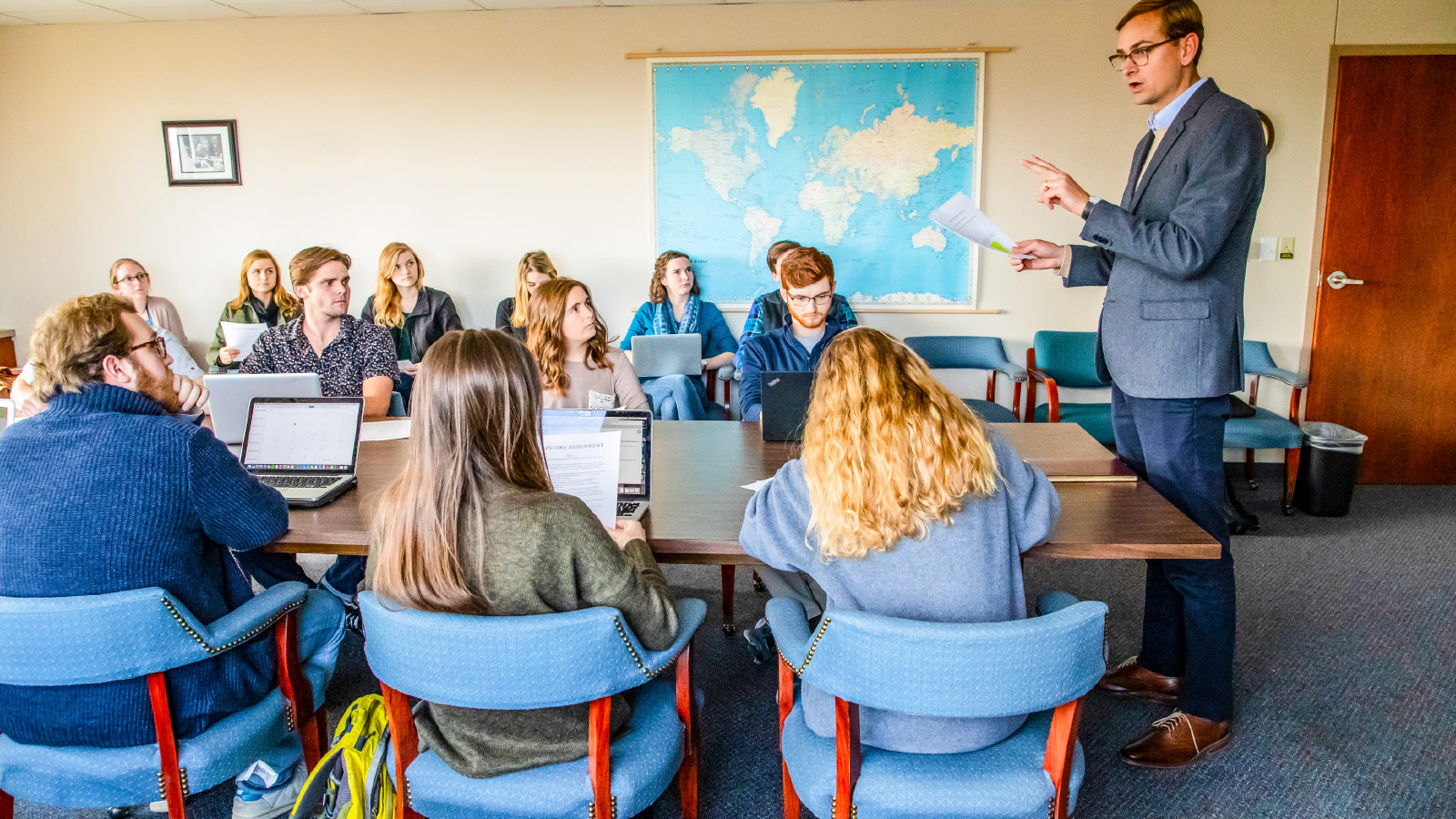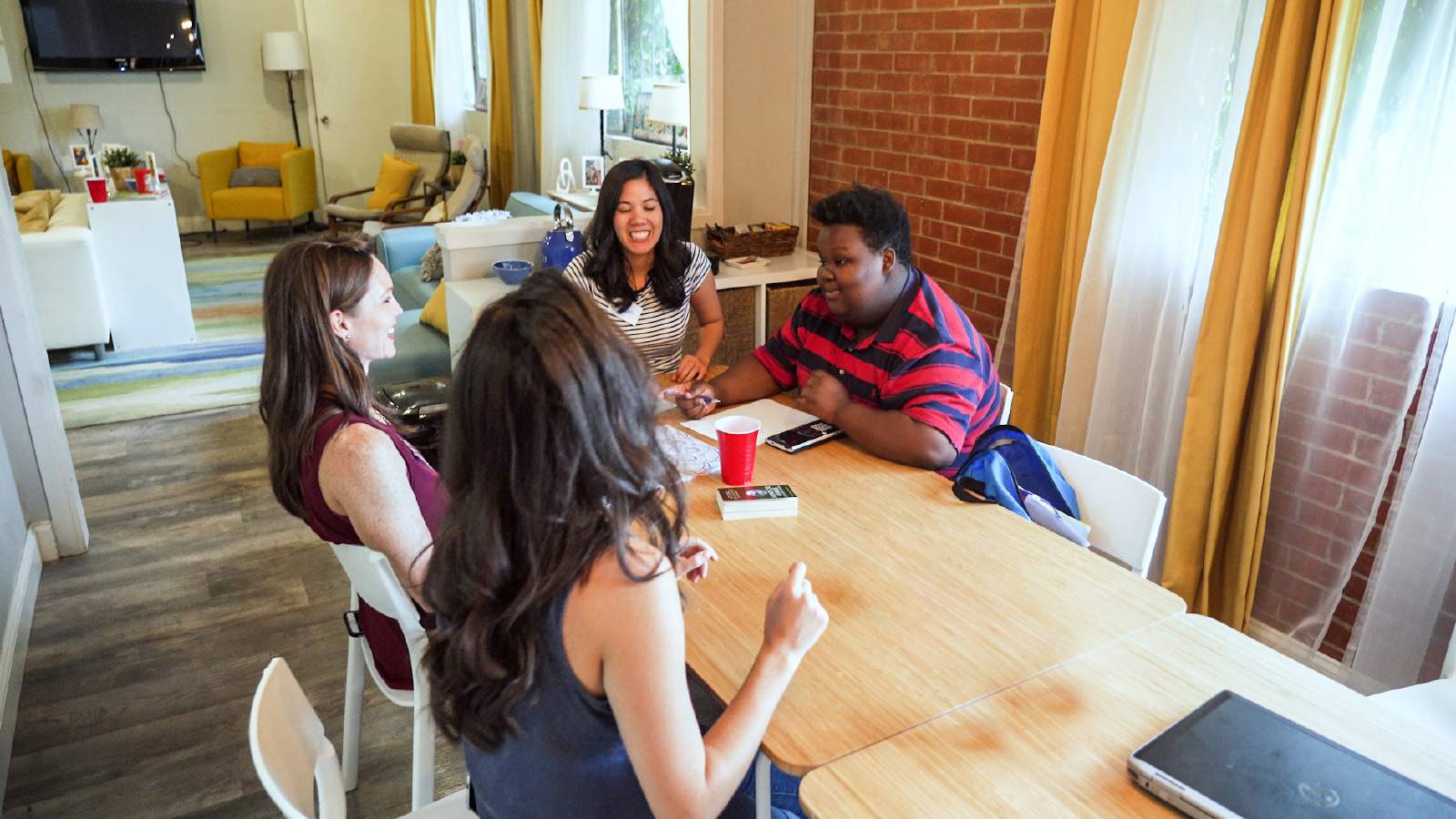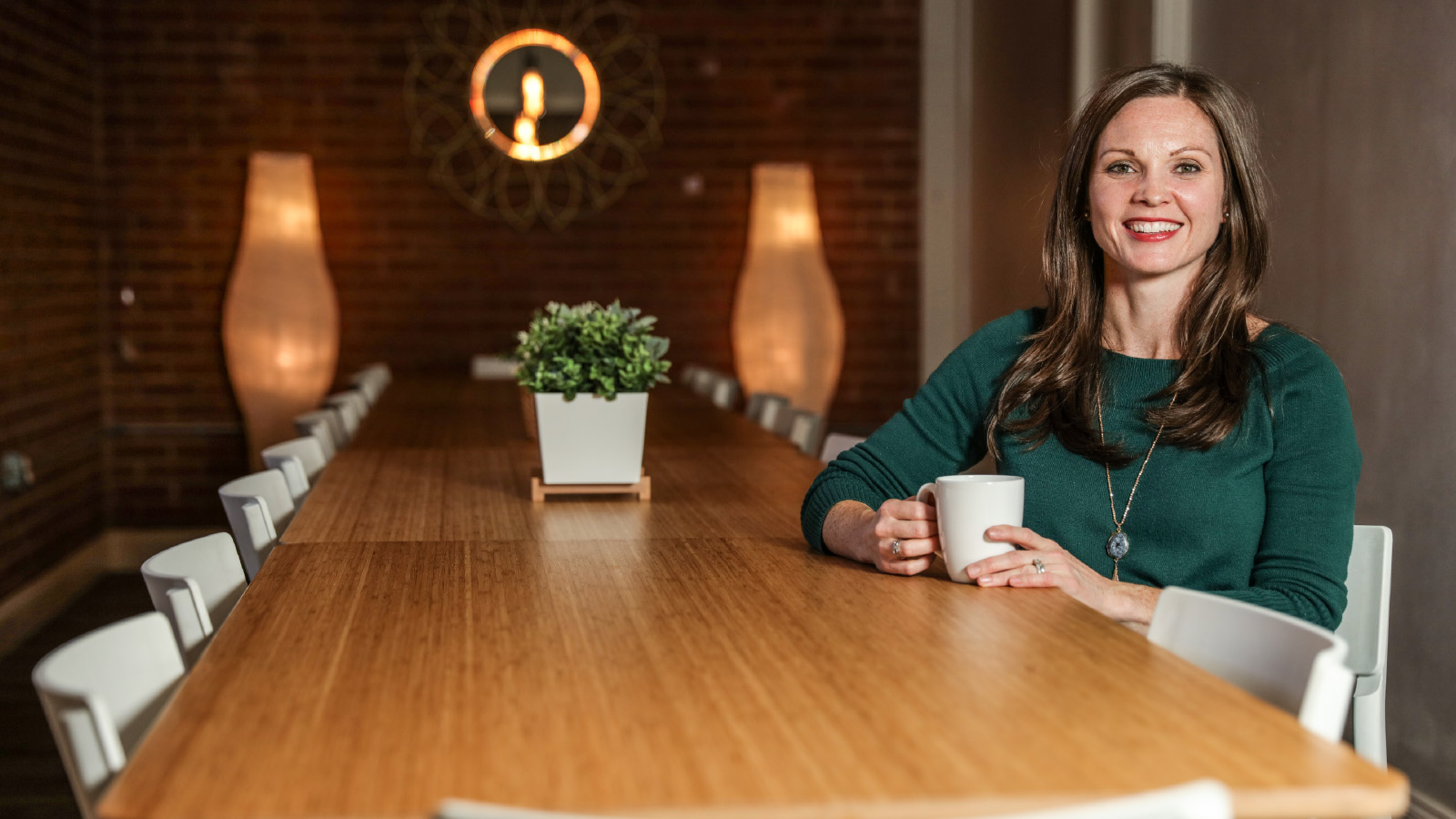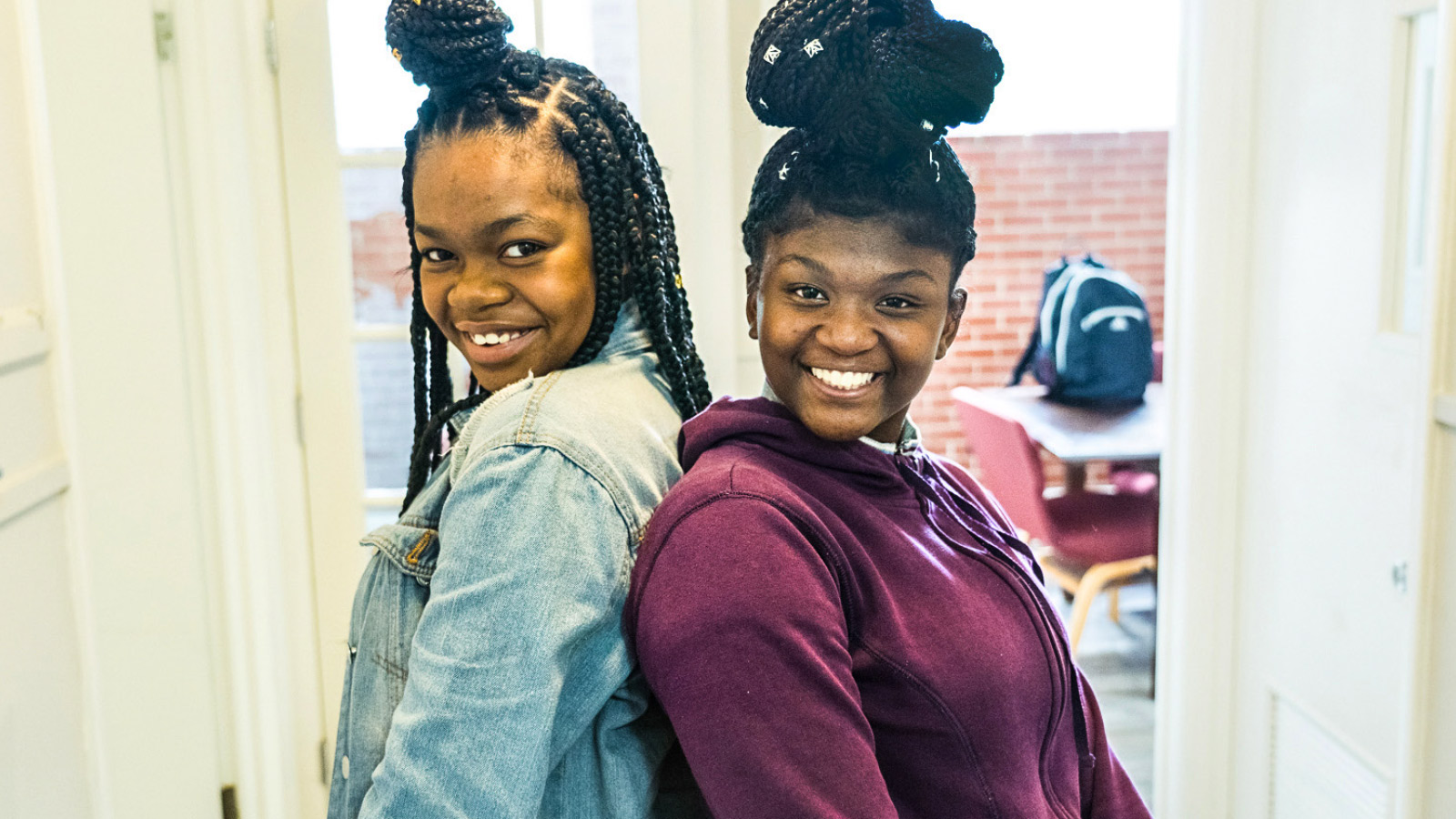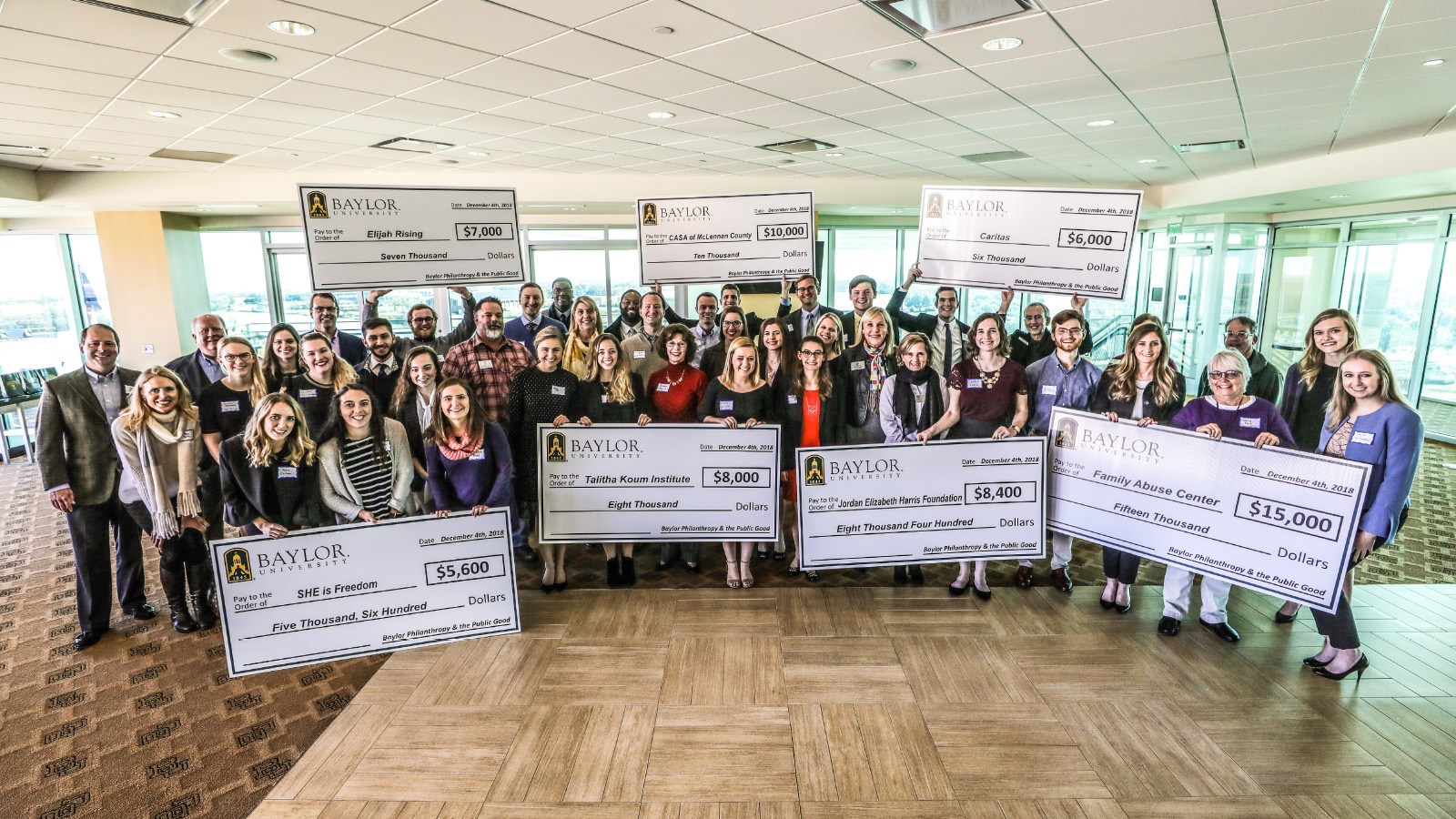Learning to Give
Philanthropy and the Public Good course guides students through a rigorous grant process and equips them for lives of discerning generosity.
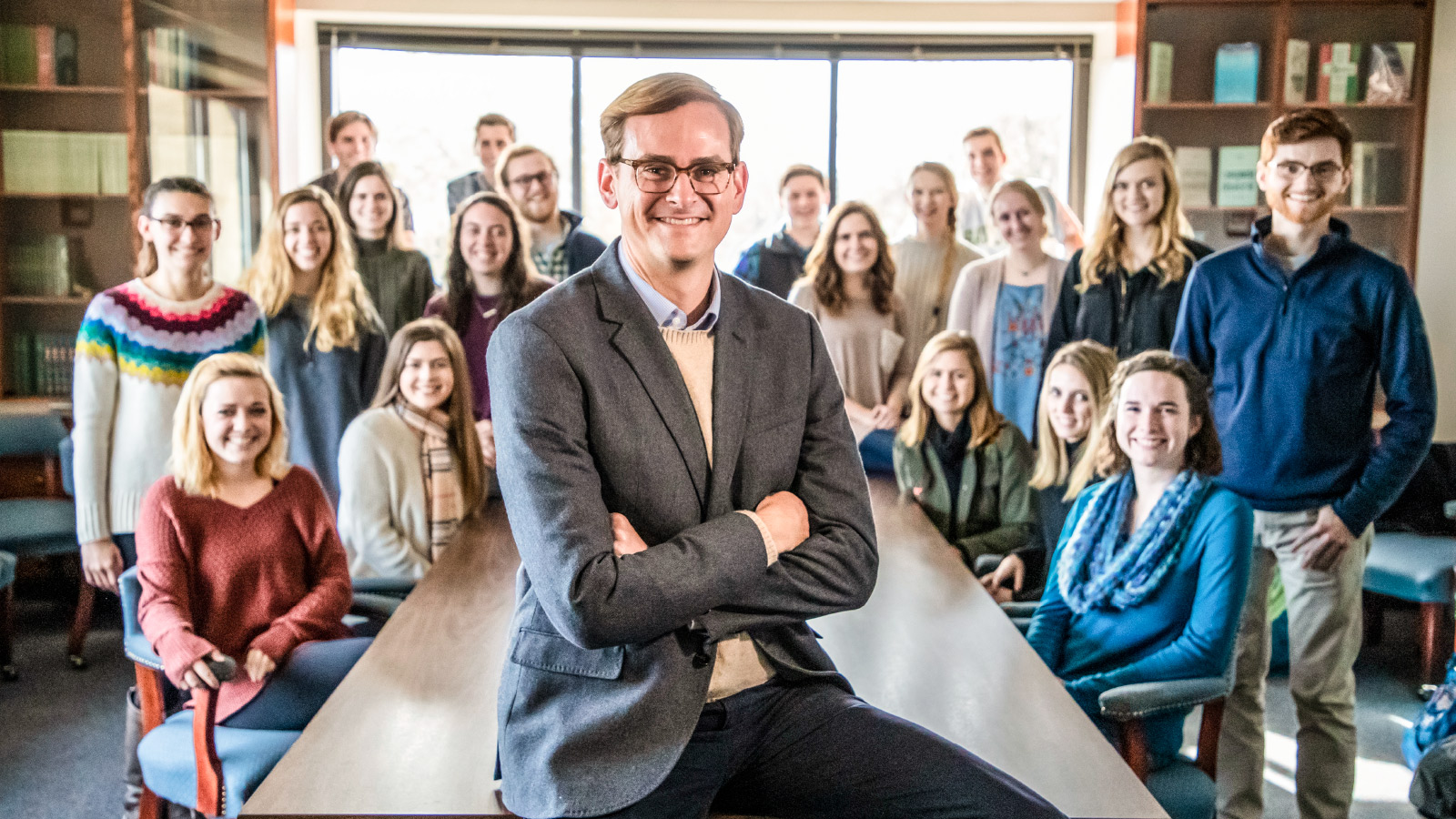
“Instruct them to do good, to be rich in good works, to be generous and ready to share … so that they may take hold of that which is life indeed.”
I Timothy 6:18-19 (NASB)
From the fifth-floor reception area in McLane Stadium, visitors may easily see threads of the Baylor-Waco tapestry—campus, downtown, the Baylor Research and Innovation Collaborative, and development springing up and extending from I-35.
The sweeping vista provides a providential backdrop for the capstone moment of a life-shaping academic opportunity through Philanthropy and the Public Good, a unique Baylor class.
Each 15-week course of Philanthropy and the Public Good [PPS 4310], culminates with the grant awards reception at the stadium. There, the students in the class are joined by representatives from local nonprofit organizations that will share more than $50,000 of grant money. Each organization is chosen by the class members following a rigorous process in which students essentially form a charitable foundation board of directors that winnows dozens of prospects to a handful of recipients.
“Taking the class inspired me on a journey of generosity,” Diana Castillo, BA ’17, says. “There’s an idea of what philanthropy and charity mean, but Philanthropy and the Public Good shows you what it’s like when they’re carried into action.”
Philanthropy and the Public Good stands out among the offerings at a University that prizes hands-on leadership and service opportunities in and out of the classroom. Students face real choices and the responsibility incumbent with the charge to be good stewards of the resources they are provided—awarding more than $600,000 during the past five years.
Instruct Them to do Good
“This class is a pretty elaborate process aimed toward cultivating in students what we call ‘lives of generosity,’” Honors Program senior lecturer Andy Hogue, MA ’05, PhD ’09, says. “We hope this is a tangible embodiment of the Baylor mission. Our students are learning and serving and leading, all at once.”
Philanthropy and the Public Good, also known throughout the campus and community as the Baylor Philanthropy Initiative, is found within the broader Baylor Philanthropy and Public Service Program in the University’s Honors College. Hogue teaches the course and is the director of the program. Founded in 1990, the program moved into the Baylor Honors College in 2014. The course is one of a number of other classes, many taught by community nonprofit leaders, designed to pair academic learning with pursuit of the public good.
The strength of the Baylor Philanthropy Initiative is that the students determine the outcomes. A 13-page syllabus wastes little time in informing them: “You are in charge of the decisions. You are the board of directors.”
“Students walk in thinking this is going to be easy,” Hogue says. “When they realize how vast the needs are and how many different, wonderful organizations are out there aspiring to meet those needs, the process becomes a bit more overwhelming.”
The premise is simple. Donors provide more than $50,000 each semester for students to share with deserving organizations, most of which are in Waco. Students research, study and collaborate to collectively determine how to divide those funds among the nonprofit nominations.
However, the process is less simple. By design, students quickly understand that the problems are endless, the worthy organizations seeking to address those issues are plentiful, and the students’ capacity—which is a generous sum of money to distribute—is finite.
“Students walk in thinking this is going to be easy,” Hogue says. “When they realize how vast the needs are and how many different, wonderful organizations are out there aspiring to meet those needs, the process becomes a bit more overwhelming. They’re not making a binary choice between good and bad, but between a number of good options. What we really try to do is equip them for both the task at hand in the semester and for a much larger horizon—a lifetime of mindful, strategic generosity.”
To guide students through the process, the class is divided into three phases. In the first phase, each student researches and nominates four deserving organizations and creates an organizational profile to inform fellow students. The 20-student class nominates 80 organizations, with that number quickly whittled down to 30 for additional consideration.
Baylor Philanthropy Award Recipients Since 2014
“Right off the bat, you recognize how many incredible organizations there are in Waco,” Rebecca Voth, BA ’18, says. “It was eye-opening to me to see how many are addressing the many complex needs in the community. When we started, $50,000 seemed like a lot, but it seemed to shrink because you find yourself wanting to give to all of them.”
In the second phase, students work in pairs to focus deeper research on three of the remaining 30 nonprofits. Students serve as program officers for their assigned organizations, and each pair writes a three-page report for the edification of their classmates. At the end of the second phase, 10 organizations are selected to advance in the consideration process.
By the time students reach the third phase, they have reviewed financial analyses and other factors that demonstrate organizational success for the remaining nonprofits. It is in this phase that students move toward making the tangible decisions of determining who will receive the actual grants. Students conduct site visits of the remaining organizations either in person for local groups or via Skype interviews for those outside the city. Organizations share specifics about how grants would be used, and students then work to project whether those grants would be successful.
Students produce eight-page briefing books for their assigned nonprofit for class consideration, followed by their de facto board of directors meetings. In an executive session that generally takes hours to complete, students divide and assign the money which is later presented in the grant awards reception.
“It’s a process,” senior finance and Business Fellows major Mark Richards says. “It changes the way you look at things. The due diligence required to allocate the money, to make decisions as a group and to see what impacted your classmates brought us together as a team. That focus introduced us to some real needs in our community and ways we can help our neighbors.”
Be Rich in Good Works, Generous
An average night sees six to 20 high school students visit The Cove, an organization that provides homeless youth in the Waco area a safe place to thrive.
The Cove’s 3,200-square-foot facility in the heart of Waco is a welcoming environment to have a meal, to do homework, to hear from speakers and to interact with graduate student volunteers from Baylor’s Diana R. Garland School of Social Work. Most of all, it is a place to simply be a normal teenager. Hundreds of students who face precarious home situations discover The Cove is a place of stability and friendship—and the fingerprints of Philanthropy and the Public Good students are found throughout the organization.
The Cove is on the roll call of Waco area nonprofits that have received at least one grant from the class. A few of the other beneficiaries include Caritas food pantry, The Advocacy Center, Take Heart Ministries, Waco Hispanic Center and REACH Therapeutic Riding Center.
“They’ve allowed us to exist, honestly,” Kelly Atkinson, BA ’01, MSW ’02, executive director of The Cove, says. “They caught the vision early on, and they’ve made a big difference—for us and for this community.”
In 2016, The Cove was in its formative stages when they were connected with the class. The group’s budget was consumed by staff and facility expenses. A grant from Philanthropy and the Public Good filled in gaps and allowed The Cove to move forward.
With 80 percent of its $250,000 annual budget funded by private donations, the ability to apply for and receive grants from the Philanthropy Initiative continues to be a meaningful income source for the nonprofit. A 2018 designation, for example, meant The Cove could chart a strategic path to provide housing solutions for youth who have no other place to go.
“The Baylor program and the students are incredibly inspiring,” Atkinson says. “They come from different majors and work together to ask very thoughtful questions about what we’re going to do to impact people. The way they assess our plans from multiple angles and deliberately immerse themselves into what’s happening throughout the Waco community is admirable. Just interacting with them, you see them valuing wise stewardship and giving back.”
Students, in turn, come away from the process with a new appreciation for the servants who address complex problems, such as youth homelessness, in a holistic and direct way.
“There are so many underlying layers to the challenges we face,” Castillo says. “To see what nonprofits are already doing was an incredible learning experience. The process of learning the details and insights into what these organizations were doing and how they would use the money gave me insight into how to research and understand the complexities of issues like homelessness or poverty. It instilled in me that I can continue to do this now that I’ve graduated.”
Take Hold of That Which is Life
“We focus in the class on philanthropy, grant-making, the social sector and due diligence, but there’s a more important objective,” Hogue says. “Who are we becoming as a result of this? As a result of what we know and what we’ve done, how are we developing as people who are generous, purposeful and able to demonstrate love?”
The process takes different forms for each student, including previously mentioned course participants Rebecca Voth, Diana Castillo and Mark Richards.
Voth began her journey in 2010 when the then high school student founded a nonprofit organization in her hometown of Rockwall. She joined with other competitive swimmers to create Splash Inc. with a mission to combat youth drownings by providing swimming education to Dallas-area children. At Baylor, she worked to help secure legal rights for Syrian and Central American refugees. After receiving a prestigious Fulbright English Teaching Assistantship last spring, she is teaching in Mexico City with plans to pursue law school at Pepperdine when her Fulbright experience concludes. She continues to be mindful of lessons learned in the Philanthropy Initiative.
“It definitely showed me that I have a responsibility to be giving back to my local community,” Voth says. “I can and will be able to make a difference, regardless of how much money I make. You can use your resources, whatever they may be, to bless others in rich ways.”
“I can and will be able to make a difference, regardless of how much money I make. You can use your resources, whatever they may be, to bless others in rich ways.”
Castillo’s path incorporates her and her family’s experiences as refugees from Colombia. She lived in Florida and then Texas, where she came to Baylor as a first-generation American college student. After graduation in 2017, she stayed in Waco as an admissions analyst in the Baylor Interdisciplinary Core. Her philanthropy experience gave rise to a passion for the community she’s come to call home.
“I’ve continued working with Waco nonprofits since I graduated,” Castillo says. “I’m seeing how much more there is that can be done here. The class, the experiences and the texts we read helped me to not only think about how to live that out, but to put it into action. You can lead a good life, but you can live a richer life by giving of your time, your treasure and your talent.”
Richards’ destination after graduation in spring 2019 is Chicago, where he will begin a management consulting position with Accenture. Amid the excitement of a new job in a new city, he is anchored by a long-term vision of what a career can mean for himself and his future family and neighbors.
“One thing I learned from the course is that the money I make is not just God’s blessing, but it is actually His money,” Richards says. “I ought not to think first of what I can spend, but what I can do to impact the Kingdom and society as well. We’re all cogs in the wheel of a larger process, just like we were in the class.
“This experience helped us all center around the goal of doing the most good for society and doing that out of a heart that loves Christ. There’s so much more we could say, but that encapsulates what it’s all about.”
Purposeful Philanthropy
Donors provide the fuel that allows the Baylor Philanthropy Initiative (BPI) to offer true-life experiences that ignite generosity and stewardship in the next generation. Among those donors are husband and wife Mark Leyerle, BBA ’87, and Shannon Leyerle, BA ’87.
“This program is a perfect fit for Baylor, cultivating a generous spirit in our future Christian leaders,” Mark says. “It’s a high-impact program, because it shows students how to pursue philanthropy practically, academically and spiritually and to think about how their own stewardship can meet the needs of the world around us.”
Shannon says BPI gifts “are about what students take with them after they leave Baylor. It’s exciting to think about graduates with an ingrained culture of generosity, who recognize the value of giving and investing in others.”
To learn more about or to give to the Baylor Philanthropy Initiative, visit baylor.edu/philanthropy or contact Hope_Loomis@baylor.edu.
